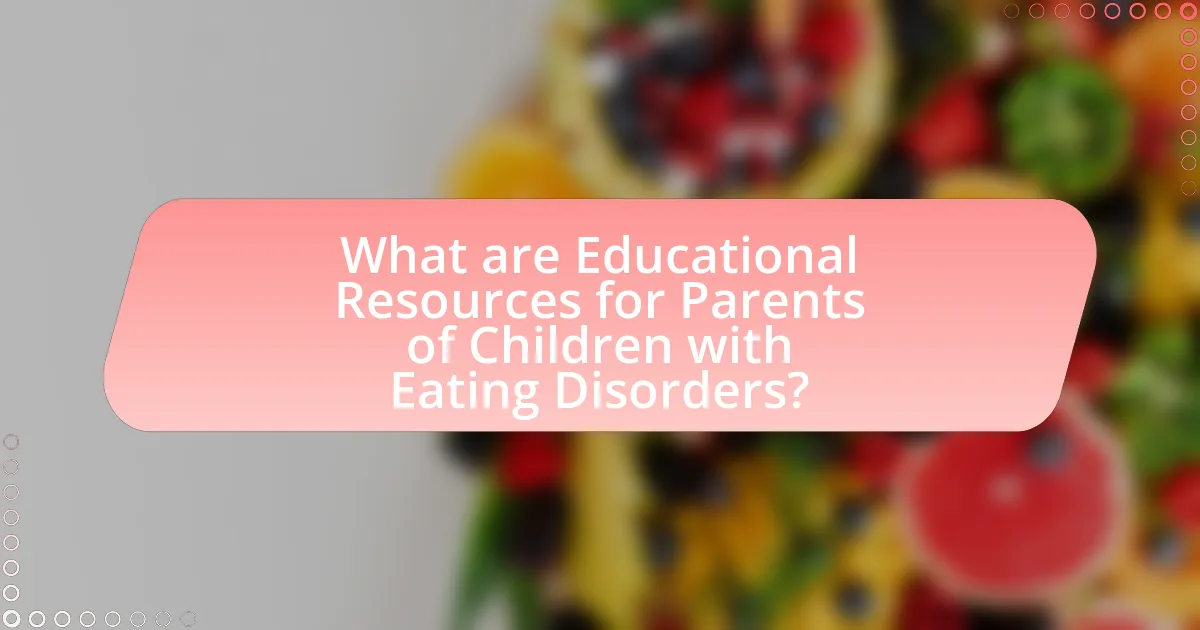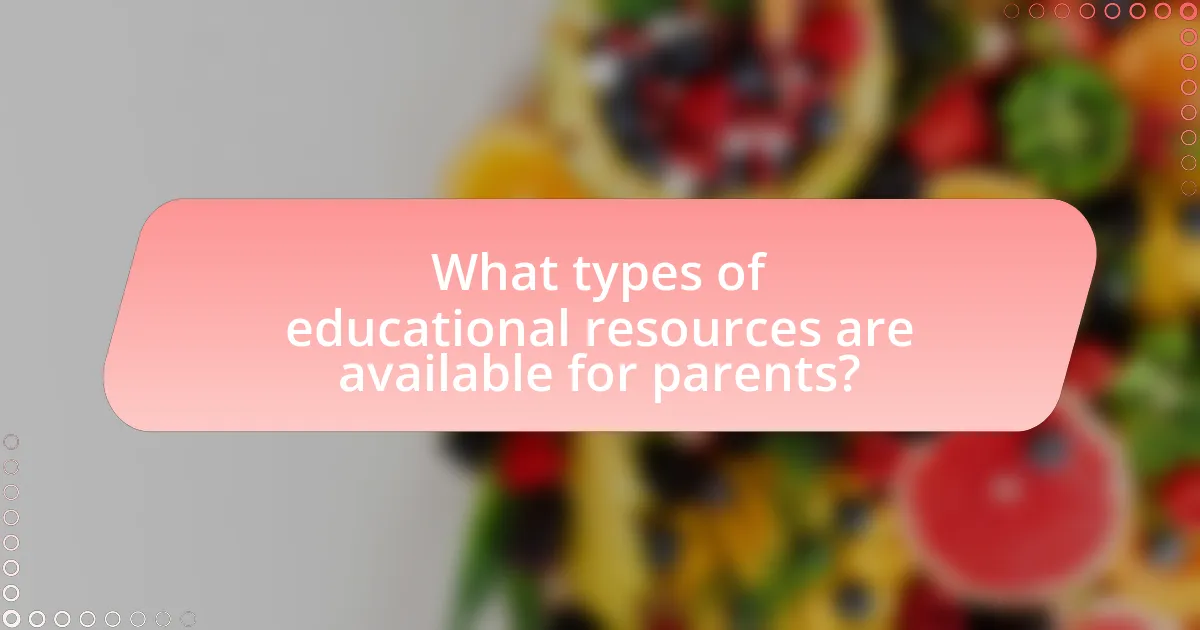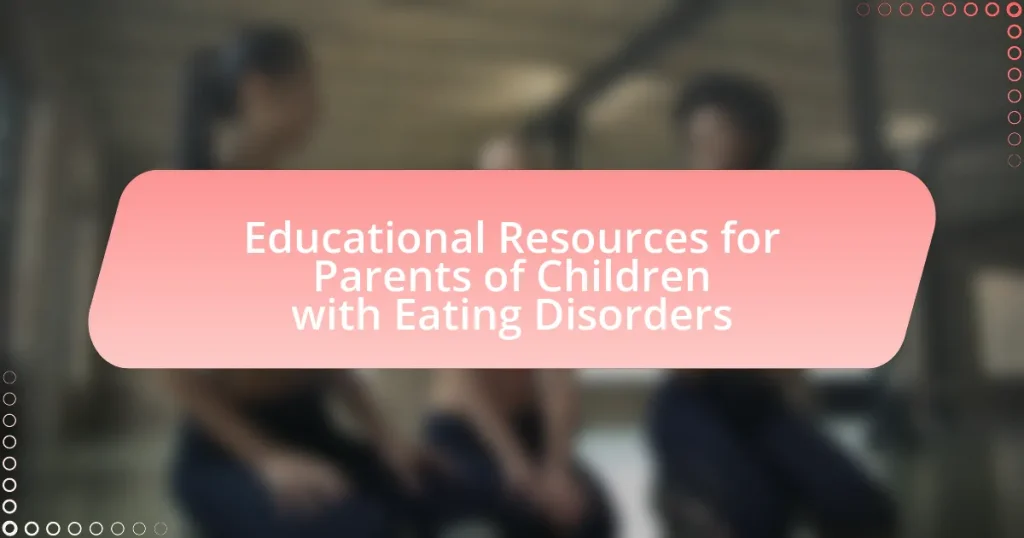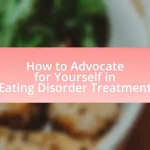Educational resources for parents of children with eating disorders encompass a variety of materials, including books, online courses, support groups, and informational websites. These resources aim to enhance parents’ understanding of eating disorders, treatment options, and coping strategies, ultimately empowering them to support their children effectively. Key organizations, such as the National Eating Disorders Association, provide comprehensive guides and webinars tailored for parents, while personal narratives and community support foster shared experiences. The article outlines the importance of these resources in recognizing symptoms, advocating for children, and creating a supportive environment, as well as the challenges parents face in accessing reliable information.

What are Educational Resources for Parents of Children with Eating Disorders?
Educational resources for parents of children with eating disorders include books, online courses, support groups, and informational websites. These resources provide essential knowledge about eating disorders, treatment options, and coping strategies. For instance, the National Eating Disorders Association (NEDA) offers a wealth of information, including guides and webinars specifically designed for parents. Additionally, books such as “Help Your Child Recover from an Eating Disorder” by Gregory Jantz provide practical advice and insights into the recovery process. Support groups, both in-person and online, allow parents to connect with others facing similar challenges, fostering a sense of community and shared understanding.
How can these resources support parents in understanding eating disorders?
Educational resources for parents can significantly enhance their understanding of eating disorders by providing accurate information, practical strategies, and emotional support. These resources often include evidence-based literature, workshops, and online platforms that explain the symptoms, causes, and treatment options for eating disorders. For instance, the National Eating Disorders Association offers comprehensive guides that detail the various types of eating disorders, helping parents recognize warning signs and understand the complexities involved. Additionally, resources may include personal stories and testimonials from other parents, which can foster a sense of community and shared experience, making it easier for parents to navigate their child’s challenges.
What types of educational materials are available for parents?
Parents can access various educational materials designed to support them in understanding and addressing eating disorders in their children. These materials include books that provide insights into the nature of eating disorders, guides that outline treatment options and coping strategies, online courses that offer structured learning about nutrition and mental health, and support group resources that connect parents with others facing similar challenges. Research indicates that informed parents are better equipped to advocate for their children, as evidenced by studies showing improved outcomes when parents are actively involved in treatment processes.
How do these resources help in recognizing symptoms of eating disorders?
Educational resources for parents of children with eating disorders help in recognizing symptoms by providing clear guidelines and descriptions of behaviors associated with these disorders. These resources often include checklists, symptom lists, and case studies that outline common signs such as drastic weight changes, preoccupation with food, and changes in eating habits. For instance, the National Eating Disorders Association offers comprehensive materials that detail specific symptoms, enabling parents to identify potential issues early. By educating parents on these indicators, the resources empower them to take timely action, which is crucial for effective intervention and support.
Why is it important for parents to access educational resources?
It is important for parents to access educational resources because these resources provide critical information and support that can enhance their understanding of their child’s eating disorder. Accessing educational materials equips parents with knowledge about the symptoms, treatment options, and coping strategies, which can lead to more effective communication and support for their child. Research indicates that informed parents are better able to advocate for their child’s needs and navigate the healthcare system, ultimately improving treatment outcomes. For instance, a study published in the Journal of Eating Disorders highlights that parental involvement and education significantly correlate with positive recovery trajectories in children with eating disorders.
What role do parents play in the recovery of children with eating disorders?
Parents play a crucial role in the recovery of children with eating disorders by providing emotional support, fostering open communication, and facilitating access to professional treatment. Their involvement can significantly influence the child’s willingness to engage in recovery efforts, as studies indicate that parental support is linked to better treatment outcomes. For instance, research published in the Journal of the American Academy of Child and Adolescent Psychiatry highlights that families who actively participate in therapy and maintain a supportive environment contribute to a higher likelihood of recovery for their children.
How can knowledge empower parents to advocate for their children?
Knowledge empowers parents to advocate for their children by equipping them with the necessary information to understand their child’s needs and rights. When parents are informed about eating disorders, treatment options, and educational resources, they can effectively communicate with healthcare providers and educators. For instance, studies show that parents who are knowledgeable about the symptoms and consequences of eating disorders are more likely to seek appropriate interventions, leading to better outcomes for their children. Additionally, understanding legal rights, such as those outlined in the Individuals with Disabilities Education Act (IDEA), enables parents to ensure their children receive the support they need in educational settings. This informed advocacy fosters a collaborative environment between parents, professionals, and schools, ultimately benefiting the child’s recovery and educational experience.
What challenges do parents face when seeking educational resources?
Parents face several challenges when seeking educational resources for children with eating disorders, primarily including a lack of accessible information, difficulty in identifying credible sources, and emotional stress. Research indicates that many parents struggle to find reliable educational materials that specifically address the complexities of eating disorders, as general resources often do not meet their needs. A study published in the Journal of Eating Disorders highlights that parents frequently report feeling overwhelmed by the volume of conflicting information available online, which complicates their ability to make informed decisions. Additionally, the emotional toll of managing a child’s eating disorder can hinder parents’ capacity to seek out and utilize educational resources effectively.
What barriers might prevent parents from accessing these resources?
Barriers that might prevent parents from accessing educational resources for children with eating disorders include financial constraints, lack of awareness, and limited availability of resources. Financial constraints can limit parents’ ability to pay for specialized programs or materials, as many resources may not be covered by insurance. Lack of awareness about available resources can stem from insufficient information dissemination, leading parents to remain uninformed about the support options. Additionally, limited availability of resources in certain geographic areas can hinder access, particularly in rural or underserved communities where specialized services may not be present.
How can parents overcome these challenges to find the right information?
Parents can overcome challenges in finding the right information by utilizing reputable online resources, engaging with healthcare professionals, and joining support groups. Reputable online resources, such as the National Eating Disorders Association and the Academy for Eating Disorders, provide evidence-based information and guidance. Consulting healthcare professionals, including pediatricians and dietitians, ensures access to expert advice tailored to their child’s needs. Additionally, support groups offer shared experiences and recommendations, helping parents navigate the complexities of eating disorders effectively. These strategies collectively empower parents to access accurate and relevant information.
How can parents effectively utilize educational resources?
Parents can effectively utilize educational resources by actively engaging with materials that provide evidence-based information on eating disorders, such as books, online courses, and support groups. These resources can enhance their understanding of the complexities surrounding eating disorders, enabling them to offer informed support to their children. For instance, the National Eating Disorders Association offers comprehensive guides and webinars that cover various aspects of eating disorders, which can empower parents with knowledge and strategies for intervention. Additionally, utilizing local support groups can facilitate connections with other parents facing similar challenges, fostering a community of shared experiences and solutions.
What strategies can parents employ to implement learned information?
Parents can employ strategies such as consistent communication, practical application, and collaboration with professionals to implement learned information effectively. Consistent communication involves discussing the information regularly with their children to reinforce understanding and retention. Practical application means integrating learned concepts into daily routines, such as meal planning or mindfulness exercises, which helps children relate the information to real-life situations. Collaboration with professionals, such as therapists or dietitians, ensures that parents receive expert guidance and support, enhancing the effectiveness of the strategies they implement. These approaches are supported by research indicating that active engagement and structured support significantly improve outcomes for children with eating disorders.
How can parents create a supportive environment using these resources?
Parents can create a supportive environment by actively utilizing educational resources tailored for children with eating disorders. By engaging with these resources, such as books, online courses, and support groups, parents can gain essential knowledge about the complexities of eating disorders, which enables them to respond effectively to their child’s needs. Research indicates that informed parents can foster open communication and understanding, which are critical for recovery. For instance, a study published in the Journal of Eating Disorders highlights that parental involvement and education significantly improve treatment outcomes for children facing these challenges.

What types of educational resources are available for parents?
Parents of children with eating disorders can access various educational resources, including online courses, support groups, books, and informational websites. Online courses, such as those offered by the National Eating Disorders Association, provide structured learning about eating disorders and coping strategies. Support groups, both in-person and virtual, allow parents to connect with others facing similar challenges, fostering a sense of community and shared experience. Books written by experts in the field, like “Help Your Child Recover from an Eating Disorder” by Gregory Jantz, offer practical advice and insights. Informational websites, such as the Academy for Eating Disorders, provide research-based articles and resources to help parents understand the complexities of eating disorders. These resources collectively equip parents with knowledge and support to better assist their children.
What online resources can parents access for information on eating disorders?
Parents can access several online resources for information on eating disorders, including the National Eating Disorders Association (NEDA) website, which offers comprehensive information, support, and resources for families. Additionally, the Academy for Eating Disorders (AED) provides educational materials and research updates relevant to eating disorders. The Substance Abuse and Mental Health Services Administration (SAMHSA) also offers resources that include treatment options and support for families dealing with eating disorders. These organizations are recognized for their expertise and commitment to providing accurate and helpful information to parents seeking guidance on this critical issue.
Which websites are reputable for providing guidance and support?
Reputable websites for providing guidance and support for parents of children with eating disorders include the National Eating Disorders Association (NEDA), Eating Disorders Anonymous (EDA), and the Academy for Eating Disorders (AED). NEDA offers resources such as a helpline, treatment options, and educational materials specifically designed for families. EDA provides support groups and recovery resources that focus on community and shared experiences. AED is dedicated to advancing research and education on eating disorders, offering valuable information for parents seeking to understand and address these issues. These organizations are recognized for their expertise and commitment to supporting families affected by eating disorders.
How can online forums and communities benefit parents?
Online forums and communities can significantly benefit parents by providing a platform for sharing experiences, advice, and resources related to managing children’s eating disorders. These online spaces facilitate peer support, allowing parents to connect with others facing similar challenges, which can reduce feelings of isolation and stress. Research indicates that social support is crucial for coping with the emotional burden of caring for a child with an eating disorder, as it enhances resilience and promotes mental well-being. Additionally, forums often feature expert insights and educational materials, equipping parents with knowledge about treatment options and coping strategies, thereby empowering them to make informed decisions for their children’s health.
What printed materials are useful for parents?
Printed materials useful for parents of children with eating disorders include informational brochures, educational booklets, and resource guides. These materials often provide insights into the nature of eating disorders, treatment options, and coping strategies. For example, the National Eating Disorders Association offers brochures that explain different types of eating disorders and their symptoms, which can help parents recognize issues early. Additionally, books such as “Help Your Child Recover from an Eating Disorder” by Jennifer J. Thomas and “The Eating Disorder Sourcebook” by Carolyn Costin provide comprehensive information and practical advice for parents navigating these challenges. These resources are validated by research indicating that informed parents can significantly impact their child’s recovery process.
What books are recommended for understanding eating disorders?
“Understanding Eating Disorders: A Comprehensive Guide for Parents” by Dr. Jennifer Thomas is highly recommended for understanding eating disorders. This book provides insights into the psychological and physical aspects of eating disorders, offering practical advice for parents. Another essential read is “The Eating Disorder Sourcebook” by Carolyn Costin, which serves as a thorough resource detailing various types of eating disorders, their symptoms, and treatment options. Additionally, “Brave Girl Eating” by Harriet Brown offers a personal narrative that illustrates the challenges faced by families dealing with eating disorders, making it relatable and informative. These books are recognized for their evidence-based approaches and have been utilized by professionals in the field to educate families.
How can pamphlets and brochures assist in quick reference?
Pamphlets and brochures assist in quick reference by providing concise, organized information that is easily accessible. These materials typically summarize key points, such as symptoms, treatment options, and resources related to eating disorders, allowing parents to quickly find essential information without sifting through lengthy texts. Research indicates that visual aids, like pamphlets, enhance information retention and understanding, making them effective tools for parents seeking immediate guidance in stressful situations.
What professional support resources are available?
Professional support resources available for parents of children with eating disorders include mental health professionals, support groups, and educational programs. Mental health professionals, such as psychologists and dietitians specializing in eating disorders, provide therapy and nutritional guidance tailored to the child’s needs. Support groups, like the National Eating Disorders Association (NEDA) and local community organizations, offer a platform for parents to share experiences and gain insights from others facing similar challenges. Educational programs, often provided by hospitals or clinics, equip parents with knowledge about eating disorders, treatment options, and coping strategies. These resources are essential for fostering a supportive environment for recovery.
How can therapy and counseling services aid parents and children?
Therapy and counseling services can significantly aid parents and children by providing emotional support, improving communication, and fostering coping strategies. These services help parents understand their children’s struggles, particularly in the context of eating disorders, by offering insights into the psychological aspects of these conditions. Research indicates that family-based therapy, such as the Maudsley approach, has been effective in treating adolescents with eating disorders, emphasizing the importance of parental involvement in recovery. Additionally, counseling can equip parents with tools to create a supportive home environment, which is crucial for the child’s healing process.
What role do support groups play in providing education and community?
Support groups play a crucial role in providing education and community for parents of children with eating disorders by facilitating shared experiences and knowledge exchange. These groups offer a platform where parents can learn about the complexities of eating disorders, including symptoms, treatment options, and coping strategies, often led by professionals or experienced peers. Research indicates that participation in support groups can enhance parents’ understanding of their child’s condition, reduce feelings of isolation, and foster a sense of belonging within a community facing similar challenges. For instance, a study published in the Journal of Eating Disorders found that parents who engaged in support groups reported increased confidence in managing their child’s eating disorder and improved emotional well-being.

How can parents find the right educational resources for their needs?
Parents can find the right educational resources for their needs by utilizing reputable organizations, online platforms, and community support groups that specialize in eating disorders. For instance, organizations like the National Eating Disorders Association (NEDA) provide comprehensive resources, including guides, articles, and helplines specifically tailored for parents. Additionally, online platforms such as the Academy for Eating Disorders offer webinars and educational materials that focus on the latest research and treatment options. Community support groups, both in-person and online, can also connect parents with shared experiences and valuable insights. These resources are validated by their focus on evidence-based practices and the expertise of professionals in the field of eating disorders.
What criteria should parents consider when evaluating resources?
Parents should consider the credibility, relevance, and accessibility of resources when evaluating them for children with eating disorders. Credibility involves assessing the qualifications of the authors or organizations behind the resources, ensuring they have expertise in eating disorders or related fields. Relevance pertains to how well the content addresses the specific needs and challenges faced by children with eating disorders, including age-appropriate information and practical strategies. Accessibility refers to the ease of understanding and usability of the resources, ensuring that parents can effectively implement the guidance provided. These criteria are essential for ensuring that the resources are trustworthy, applicable, and user-friendly, ultimately supporting the well-being of children with eating disorders.
How can parents assess the credibility of the information provided?
Parents can assess the credibility of the information provided by evaluating the source, checking for expert endorsements, and verifying the accuracy of the content. Reliable sources typically include academic institutions, government health agencies, and recognized medical organizations, which often provide evidence-based information. For instance, the National Eating Disorders Association offers resources that are reviewed by professionals in the field, ensuring the information is trustworthy. Additionally, parents should look for citations of scientific studies or data that support the claims made in the information, as this adds to its credibility.
What factors should influence the choice of resources for specific situations?
The choice of resources for specific situations should be influenced by the unique needs of the child, the severity of the eating disorder, and the evidence-based effectiveness of the resources. Understanding the child’s specific symptoms and challenges allows parents to select resources that directly address those issues. For instance, research indicates that tailored interventions, such as cognitive-behavioral therapy, are more effective for certain eating disorders, highlighting the importance of aligning resources with the child’s diagnosis. Additionally, the credibility of the resource, including the qualifications of the authors and the scientific backing of the information, plays a crucial role in ensuring that parents access reliable and effective support.
How can parents stay updated on new educational resources?
Parents can stay updated on new educational resources by subscribing to reputable newsletters and following organizations focused on eating disorders. These organizations, such as the National Eating Disorders Association (NEDA) and the Academy for Eating Disorders (AED), regularly publish updates on research, resources, and support options. Additionally, attending webinars and conferences related to eating disorders can provide parents with the latest information and tools. Research indicates that staying connected with these organizations enhances awareness and access to effective resources, which is crucial for supporting children with eating disorders.
What are effective ways to follow developments in eating disorder education?
Effective ways to follow developments in eating disorder education include subscribing to reputable journals, attending conferences, and engaging with professional organizations. Subscribing to journals such as the International Journal of Eating Disorders provides access to the latest research and findings in the field. Attending conferences like the Academy for Eating Disorders Annual International Conference allows for networking and learning from experts. Additionally, joining organizations such as the National Eating Disorders Association offers resources, updates, and community support, ensuring that individuals stay informed about best practices and emerging trends in eating disorder education.
How can parents connect with professionals for ongoing support and information?
Parents can connect with professionals for ongoing support and information by utilizing resources such as local support groups, online forums, and professional organizations dedicated to eating disorders. These platforms often provide access to licensed therapists, dietitians, and medical professionals who specialize in treating eating disorders. For instance, the National Eating Disorders Association (NEDA) offers a helpline and a directory of treatment providers, which can help parents find qualified professionals in their area. Additionally, attending workshops and seminars hosted by these organizations can facilitate direct interactions with experts, enhancing the support network for parents.
What practical tips can parents use to support their children with eating disorders?
Parents can support their children with eating disorders by fostering open communication, encouraging professional help, and promoting a healthy relationship with food. Open communication allows children to express their feelings and concerns without fear of judgment, which is crucial for their emotional well-being. Encouraging professional help, such as therapy or counseling, is essential as studies show that early intervention significantly improves recovery outcomes. Additionally, promoting a healthy relationship with food involves modeling balanced eating habits, avoiding negative comments about weight or appearance, and creating a supportive mealtime environment. These strategies are backed by research indicating that parental involvement plays a critical role in the recovery process for children with eating disorders.
How can parents foster open communication about eating disorders?
Parents can foster open communication about eating disorders by creating a safe and non-judgmental environment for discussions. This involves actively listening to their children, validating their feelings, and expressing concern without criticism. Research indicates that children are more likely to share their struggles when they feel supported and understood, as highlighted in a study published in the Journal of Adolescent Health, which found that open dialogue significantly reduces the stigma surrounding mental health issues. Additionally, parents should educate themselves about eating disorders to provide informed support, demonstrating empathy and understanding, which further encourages children to communicate openly.
What daily practices can parents implement to encourage healthy habits?
Parents can implement daily practices such as modeling healthy eating, encouraging physical activity, and fostering a positive body image to promote healthy habits in their children. By preparing nutritious meals and eating together as a family, parents can demonstrate the importance of balanced nutrition. Research indicates that family meals are associated with healthier dietary patterns and lower rates of disordered eating among children. Additionally, incorporating regular physical activities, such as family walks or sports, can help children develop a love for movement. Encouraging open discussions about body image and self-esteem can further support children in developing a healthy relationship with their bodies, as studies show that positive body image is linked to better mental health outcomes.


